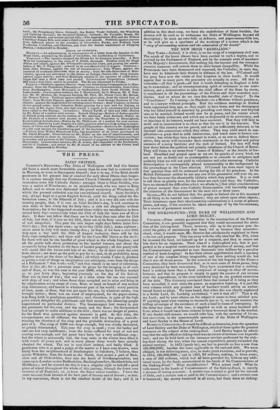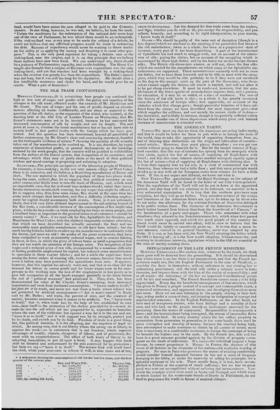THE SINK1NG-FUND—THE DUKE OF WELLINGTON AND LORD BEXLEY.
COURIER—From certain peculiarities in the construction of the Finance Committee, it was generally supposed that they would recommend the aboli- tion of the sinking-fund. Those, however, who up to the present year de- cried the policy of maintaining that fund, did so because they misunder- stood, what, it would seem, Mr. Herries has satisfactorily explained to them —its use and purpose. They ran away with the silly idea that Mr. Pitt, when he invented the fund, set himself up for a conjuror, and they in return set him down for an impostor. Their idea of a sinkin-gfund was, that it pur- ported to be a magical contrivance for the multiplication of money, and that the Commissioners pretended to turn thousands into millions by a peculiar method of book-keeping ! In fact their obtuse apprehension made a mystery of one of the simplest things imaginable, and then nothing would do, but that it was all hocus pocus. In the course of the late Inquiry of the Finance. Committee, they have discovered that, as in most cases of hocus pocus, they were deceived by their own senses. They have ascertained that a sinking- fund is nothing more than a fund composed of savings to clear off incum- bratices, and that its purpose is simply to apply the excess of our income over the expenditure, in the most beneficial way to the gradual extinction of the debt. This discovery convinced them that instead of it being as they have miscalled it ever since the peace, an expensive humbug, it is just the very scheme which any prudent man of business would advise an embar- rassed friend to adopt. We have heard, that when this was clearly explained to a Noble Lord, his Lordship exclaimed, " and is that all !" That is all, my Lord; and by your silence on the subject it seems to have satisfied you. If anything more were wanting to reconcile you to it, we might mention the trifling advantage of the existence of such a fund in times of emergency. In the three last years of the war, it supplied us with as many hundred mil- lions, when it would have been ruinous to have borrowed them in the market. If any doubts still remain, we would refer him, with the certainty of his en- tire conviction, to the unanswerable speeches of the Duke of Wellington and Lord Bexley in the House of Lords. MORNING CHRONICLE—It would be difficult to determine, from the speeches of Lord Bexley and the Duke of Wellington, which of them spoke the greatest nonsense on the subject of the sinking-fund. Lord Bexley began by admit- ting that the only effective sinking-fund was an excess of revenue over expendi- ture; and yet he held forth on the immense services performed by the sink- ing-fund during the war, when the annual expenditure greatly exceeded the annual receipts. Iii 1813 (quoth he), we had to provide no less a sum than 105,000,0001., besides the sums applicable to the national debt. We were obliged, in the followingyears, also, to make great exertions, and to provide, in 1814, 106,000,0001.; and in 1815, 92 millions, making, in three years, a sum of 303 millions, which had all been provided for, without any addi- tional taxes, by the funds accumulated in the hands of the Commissioners of the Sinking-Fund." What mystification! What arrant stuff! What he calls money in the hands of Commissioners of the Sinking-Fund, is merely a manner of stating accounts. A certain sum is stated as paid for the interest of Debt, and a certain sum as paid to time Commissioners; and a certain sum is borrowed; the money borrowed in all cases, had there been no sinking- fund, would have been minus the stun alleged to be paid to the Commis- sioners. In one thing, however, he was not, we believe, far from the mark. " Unless the machinery for the redemption of the national debt were kept catt.of the view of Parliament, he was afraid there would be no redemptidn. If the sinking-fund was every year to be made the subject of a debate, he could not believe that any effectual progress would he made in redeeming the debt. Reasons of expediency would never be wanting to throw doubts on the utility of so applying the money and diverting it to some other pur- pose." This is the only. good argument for taking a definite sum as the sinking-fund, near the surplus, and it is on that principle that we believe three millions have now been fixed. We can understand why there should be a jealousy of Parliamentary rapacity, and castle-building. The Great Un- taught also thought that a surplus of Revenue over expenditure was the only sinking-fund; and yet that wonders had been wrought by a sinking-fund when the revenue was greatly less than the expenditure. The Duke's speech was not long, but it was still too long for his reputation. He should utter a few intelligible sentences and shake his head, and he would pass for an oracle. What a pair of financiers:



















 Previous page
Previous page